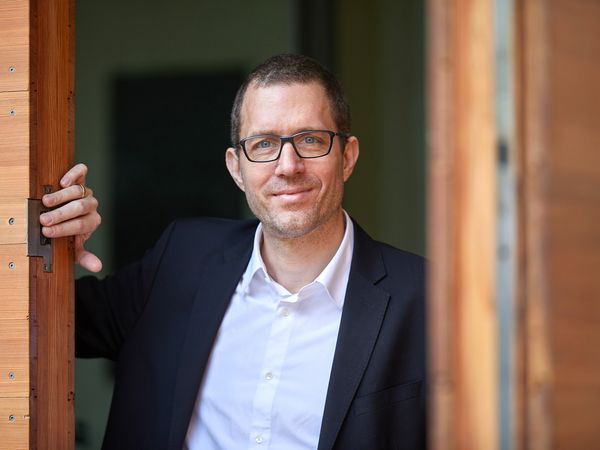Cologne is one of Germany’s biggest and most innovative centres for science. In addition to 16 universities, it boasts numerous internationally-renowned research institutions. Science is incredibly important to Cologne. The “business of science” is, after all, the city’s second-largest employer. In financial terms, Cologne‘s university landscape is worth some 1.65 billion euros per year. Dr Patrick Honecker, Director of Communications and Marketing at the University of Cologne, talks to us about the impact of digitalisation as well as Germany’s largest university and a science flagship with Excellence status, the University of Cologne.
Mister Honecker, this year sees the Global Conference on Economic Geography and World Archaeological Congress come to Cologne. The University of Cologne is participating in both. In the face of growing digitalization, do you think that people will continue to come together for congresses?
I think that getting together in person will always be important, especially for the scientific community. You can use all kinds of communication at congresses – from specialist lectures, through to academic dialogue and informal exchange. But meeting and networking convivially in a great atmosphere with a glass of Kölsch beer just isn’t possible in a virtual space.
Recently, you won a prize for the best university communication. The contest was about communicating the latest university research as knowledge society can use and, as part of that, contributing towards the wider debate. What convinced the jury to pick you?
The President of the German Rectors' Conference, Professor Horst Hippler, said something very fitting at the award ceremony. Science is the counter to populism. One of the greatest challenges is to communicate the value of doubt as a principle, open-ended questions and methodological transparency. Through our work, we’re trying to lay the groundwork for this. Our department has developed a systematic way of monitoring current social issues and also established a network of "matrix correspondents". These are located where the science is taking place. They are decentralised but, at the same time, are closely integrated into the work of the central communications department. They identify the target groups and work out how best to address them.
Cologne University is one of the oldest universities in Europe. With 6 faculties, 102 subjects, 10 cross-faculty research and teaching centres, close cooperation with the University Hospital and the research institutions of the Max Planck and Helmholtz Associations, the University of Cologne enjoys an extremely good international reputation. Since 2012, the University of Cologne has held Excellence status. What exactly does this mean for research?
The additional funding that this status comes with enables us to conduct research on future- oriented topics as part of some highly-dynamic networks. For example, the CECAD (Cellular Stress Responses in Aging-associated Diseases) Cluster of Excellence is trying to decipher the basic mechanisms of ageing and to find new therapeutic approaches to age-related diseases. The Cluster of Excellence on Plant Sciences, (CEPLAS) with its research locations in Jülich, Dusseldorf and Cologne looks at how plants can adapt better to environmental conditions in order to provide a growing world population with a stable food supply. Also supported through Excellence funding, the Global South Studies Center Cologne, GSSC, is investigating the social, economic, political and cultural changes in the countries of the Global South with the aim of making these developments more visible and promoting new options for action on current and future global challenges. CERES, the Cologne Center for Ethics, Rights, Economics, and Social Sciences and Health takes an interdisciplinary approach, cooperating with the five disciplines of philosophy, law, economics, social sciences and medicine. CERES is a centre for interdisciplinary research, education and training as well as advice on socially relevant issues in the field of health. It also acts as a network hub for scientists from Germany and abroad.
The transfer of knowledge to business plays a central role in strengthening Cologne as a business location. Jobs of the future will be created at the interface between science and the economy. How do you help transfer knowledge to business?
Let me give you an example – through the “Gateway-Gründerservice” we are committed to helping students and graduates implement their own business ideas. The large number of businesses in the area provides an ideal environment for this. Another example is the Centre for Organic Electronics COPT, which bridges the gap between cutting-edge university research and free enterprise. Young researchers will find ideal conditions in the 45 graduate schools and colleges that currently take part! The University brings Cologne to life. Cologne is one of the few German cities that is getting younger despite demographic change. More than half of the graduates stay in Cologne, start their own companies, find a job in the Cathedral City and contribute to the future of the city.
Learn more: University of Cologne
